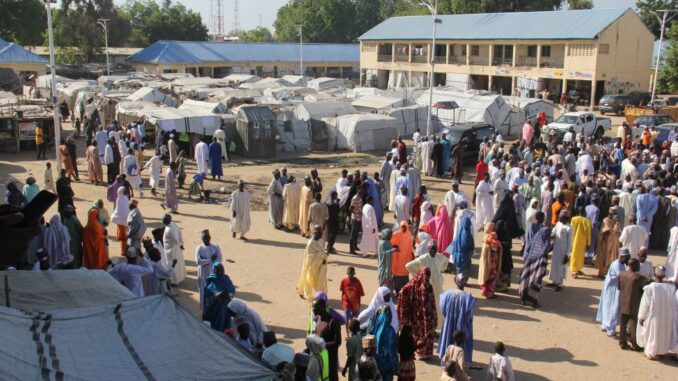
Sir: The Mutual Union of Tiv in America (MUTA) is appealing to President Muhammadu Buhari to take urgent action to ensure the safe return of a million Tiv and other citizens displaced by violence in Benue, Nasarawa, and Taraba states.
As an association of Tiv people in America with a mission to advance the wellbeing of Tiv people globally, MUTA is concerned that millions of citizens, most of them fellow Tiv kinsmen, have remained cut off from their communities for several years, with no government policy plan to return them to their homes.
In Benue State, about half a million men, women, and children remain in destitute conditions in makeshift camps created for Internally Displaced Persons (IDP). Hundreds of thousands of Tiv people in Taraba State have also been displaced as their towns and villages were overran and renamed by the Jukun.
In Nasarawa State, despite the efforts of, Governor Abdullahi Sule, to resettle the IDPs, rebuilding communities remains a challenge, and abject poverty reigns. In all three states, the problems were engendered by violent attacks resulting in mass killings, the burning and looting of homes, and the destruction of farms and property.
The situation in Benue State
The displacement in Benue State started in 2013 when armed Fulani herdsmen attacked and wreaked havoc on communities in Guma Local Government Area. These attacks have continued over the years with communities in 20 of the 23 local government areas of Benue State affected. These invasions have resulted in the massacre of thousands of people, wholesale destruction of communities, and often, total obliteration of economic and cultural assets.
Fleeing families now occupy several IDP camps across the state, with many more cohabiting with relatives in overcrowded and extremely vulnerable spaces. Benue State has 27 IDP camps accommodating more than half a million displaced citizens. The Benue State Emergency Management Agency (SEMA) classifies eight of the camps as official while the remaining 19 are unofficial. Official camps usually have SEMA staff on-site while unofficial camps are not staffed, receiving limited SEMA support.
Currently, large swaths of the lands vacated by the displaced people have been occupied by their violators. In Kwande Local Council, for example, the communities of Moon have lost their lands to armed herders who graze their cows freely while the real owners languish in IDP camps. The story is similar in Guma and other surrounding local government areas in Lower Benue.
While most of the displaced persons have expressed the desire to return to their communities, this has not been possible because of continuing insecurity as the few who went back to their communities in an attempt to rebuild their lives were killed by the occupying herders.
We interpret these killings, displacements, and land grabbing as part of a larger ethnic cleansing agenda against the Tiv. We demand that the Federal Government provides the necessary security and facilitates the return of the displaced people to their rightful communities and with full citizenship rights. We want to point out that while we are not against Fulani herdsmen residing and legally practising their trade-in Benue, it is only necessary that they be good neighbours, posing no security threat to the local communities.
Prof. Joseph T. Zume and Simon Kusugh for MUTA
Why the IDPs must be resettled
It is important that the displaced people return to their communities to end the many years of want and squalor. Most of these people are smallholder farmers who depend on the soil for their livelihood. The impact of the years already spent away from home will be felt, not just by the people experiencing the displacement but by their succeeding generations. Life in the IDP camps is simply unimaginable. Sanitation is non-existent and daily living conditions are horrendous and untenable.
IDP camps are terrains of mass starvation. For people who used to produce their own food and contribute effectively to the Nigerian food value chain, having to helplessly rely on the benevolence of others for daily survival is both humiliating and intolerable.
The most heartbreaking effects of the displacements have been on children, thousands of whom have been deprived of the opportunity to education. When a child misses one year of schooling, he or she might recover, but when a child cannot go to school year after year, that child stands a little chance of having a successful educational experience.
It is therefore essential that the government come out with a resettlement plan and take needed actions to provide security and economic empowerment for the displaced families to return to their communities.
END

Be the first to comment